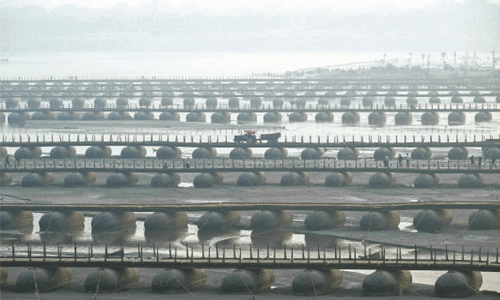
FREEDOM of speech via media and other fora is a basic right increasingly under threat. Oddly, the threats in Pakistan emanate from not manifest state bodies as elsewhere, but hidden ones. In fact, even the former seems threatened by the latter and seems helpless to protect society from such threats.
Eminent analysts like I.A. Rahman have already written against these curbs and I cannot add to their sharp analysis. But the deeper question for me is whether we really have freedom of speech even sans these curbs, for speech merely expresses human thought. If thought is not free, can speech be considered truly free?
But few write about curbs on thought which differ from those on speech. They are more subtle and hidden. While curbs on speech ebb and flow in intensity, curbs on thought are more ongoing and even. Curbs on speech occur mostly in authoritarian states; those on thought are more widespread and exist in advanced capitalist states too.
We gather information from our environment (via reading and listening), process it internally (via thought) and then express it (via speech). Speech of course is severely curbed in many states. But totalitarian states also aim to control thought to further curb speech, thus restricting the access of common people to a diverse range of information beyond state-controlled media. But the human quest for truth is so strong that most totalitarian states don’t last long.
Curbs on thought are ongoing and rampant.
Advanced capitalist societies claim to give a high degree of freedom of speech. Yet, subtle curbs on freedom of thought, and hence indirectly on speech, are present, too, even if lower than in totalitarian ones. This may seem odd given the absence of overt curbs on both ends of the information-thought-speech chain. Speech is overtly free, and people seemingly have access to a bewildering range of information in the US. But this endless access curbs thought too, for it creates an information overload which limits actual access despite the high potential access.
The vast majority of people made tired daily by long jobs and commutes lack time to surf all this information. They largely rely on mainstream media, which, as lucidly explained by social critic Noam Chomsky, is controlled by corporate US and presents perspectives aligned to US global interests. Thus, despite the potential access, most people remain limited to a narrow range of sources of information, so seductive are the tools of corporate media.
Many societal institutions there participate in this numbing of minds of the masses. People are encouraged to accept the positions enunciated by those having authority on key issues, eg, the ills of capitalism and US foreign policies. Pricey business schools claim to impart out-of-the-box thinking skills. But out of the box, there is actually a bigger cage representing the limits of the US corporate-state narrative. There is a vacuous freedom to choose from dozens of brands for different products and hundreds of similar TV channels but less freedom to think about key questions like the meaning of life and alternative lifestyles.
If this is the situation in the ‘free world’, what hope is there for freedom of thought in less-free South Asia? Markets are less powerful there and hence play a lesser role in restricting thought. But it is the state in partnership with non-state actors, eg clerics, that directly takes the lead in controlling thought via various indoctrination tools. Narratives are built which weave together themes of national patriotism, religious fervour and external conspiracies to keep people under control. The information-thought-speech chain becomes compressed to only information-speech with thought largely eliminated. People merely parrot and pass on the information provided by state institutions via speech without analysing it through deep thought.
The value of such control is self-evident. A large majority is neutralised easily via such subtle and violence-free tactics, reducing the number of people who then have to be controlled via more coercive and overt action against free speech of those who maintain freedom of thought. They have to be silenced despite their small numbers since they not only speak, but their speech aims to instigate the masses to regain freedom of thought. They thus become doubly dangerous and have to be silenced. The state fails to eliminate them completely, but neither do these people succeed in creating mass thought emancipation among people.
Freedom of thought and hence speech remain restricted globally. This demeans and undermines the true potential of humanity, as it greatly loses the key capability that differentiates it from lower animals. Descartes, the celebrated 17th-century French philosopher, famously said: I think, therefore I am (exist). So then if we don’t think, do we really exist?
The writer is a Senior Fellow with UC Berkeley and heads INSPIRING Pakistan, a progressive policy unit.
Published in Dawn, May 8th, 2018











































